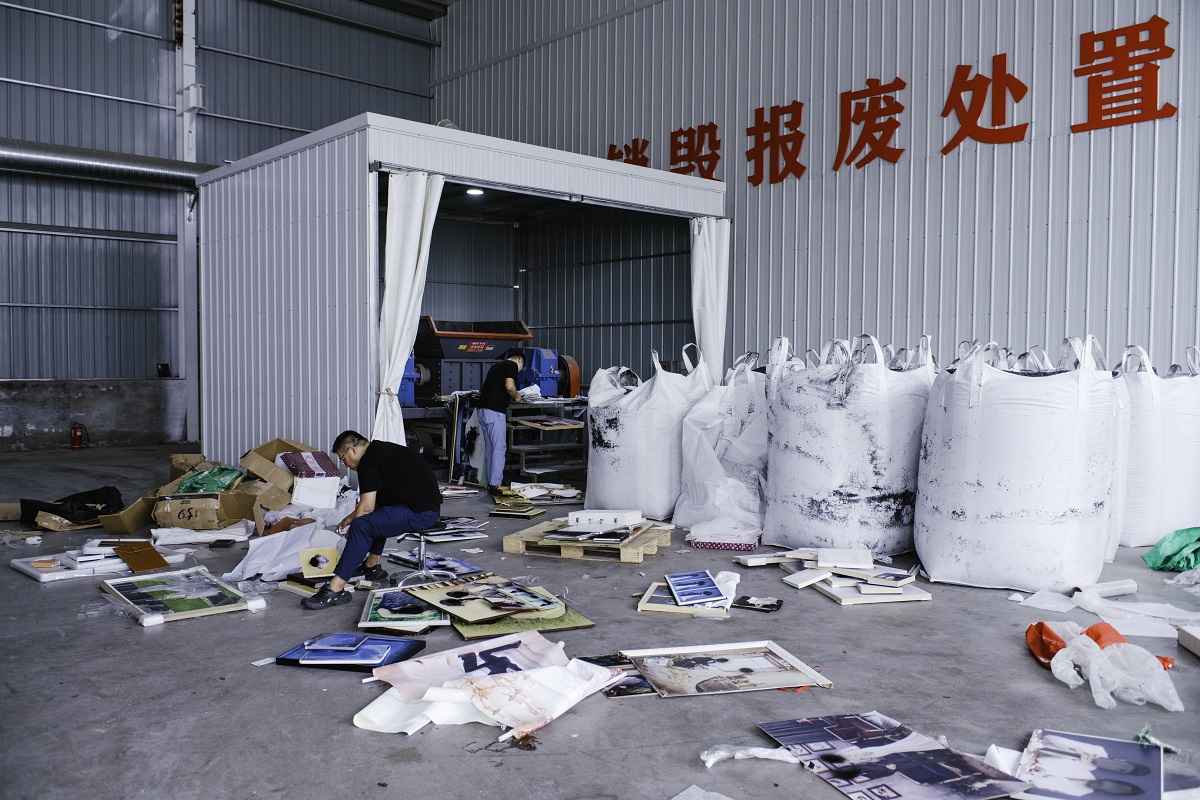
Liu and his team spray-paint faces before shredding them into pieces. They normally use dark paint, but some people might request another color.
16:33 JST, September 19, 2024
LANGFANG, China – Liu Wei calls himself a “love story morgue operator.”
Since leaving his job at a state-owned pharmaceutical company in Beijing in 2022, Liu has been running a business as a professional shredder of documents and other personal information at a factory warehouse in Langfang, just south of the capital. It was not a particularly lucrative endeavor until Liu seized upon a “blue ocean” market early last year: urban divorcées who want to get rid of their wedding photos.
“We are a crematorium of those photos when their life cycle ends,” Liu said in an interview with The Washington Post, employing another death-related metaphor.
There are certainly plenty of potential customers for Liu’s business.
There were more than 4 million divorces a year from 2016 to 2020, prompting the government – which is promoting traditional marriage and child-rearing as the population shrinks – to institute a mandatory 30-day cooling-off period in 2021 to deter “impulsive” separations. That has helped bring down the divorce rate to less than 3 million a year since 2021. Some 1.3 million Chinese couples have already divorced in the first half of this year.
That leaves many with the question of what to do with their framed marriage portraits, some 5 feet tall.
As China has grown richer and the middle class has burgeoned, pre-wedding photo shoots have become commonplace. A couple can spend many hours and thousands of dollars going through multiple costume and location changes to pose in marital perfection, and huge versions of the resulting photos will be displayed at their wedding reception and in their home afterward – and all over social media, of course.
But what happens when the image of marital perfection doesn’t pan out? Dumping the photos is out of the question in cities with strict waste sorting rules, and privacy is also a concern. Burning photos of people who are still alive is considered bad luck in Chinese superstition – even for estranged spouses.
Liu – who is 42 and married, but never had one of these fancy photo shoots – has the answer.
“Just send the photos over … and we will make them disappear completely, as if they had never existed,” he said in a promotional video on Douyin, the Chinese version of TikTok, as co-workers stepped on or jumped on some framed photos to show how some durable material – such as acrylic, glass, wood and metal – can be too hard to break at home. The clip got more than a million views – and Liu’s business took off.
Now photo destruction accounts for more than 95 percent of his business, and some 80 percent of those pictures are wedding photos. Many of the photos were shot by professional photographers in locations as far away as Tibet and Paris.
When packages arrive at his factory, Liu and his team make a video showing the boxes being opened and the items counted and weighed to determine the price. In addition to wedding photos, the boxes have been known to contain towels, bedding and diaries.
Then they get to work destroying everything.
For photos, Liu and his co-workers spray-paint faces and distinguishing features like tattoos, piercings and physical disabilities with dark paint – partly to protect client privacy and sometimes to make sure they doubly obliterate the memories. Some customers request a particular color and some ask for patterns like a Taoist talisman to “exorcise toxicity.”
Things that can’t go through the heavy-duty shredders, like glass and wood, instead meet their fate with a sledgehammer.
Then Liu sends his client a video of the whole process – sometimes to an upbeat soundtrack – before the debris is sent to a waste-to-energy facility where it becomes biofuel.
“All handled with responsibility,” Liu said, adding that some clients find “therapeutic value” in the service.
Shredding photos from a previous relationship is a “sort of farewell to the past,” said Zhou Bingbing, a 28-year-old stay-at-home mom in the southern city of Foshan.
Zhou’s husband got divorced from his previous wife in April 2020, and he stashed the photos from his first wedding in the attic of his parents’ home in another city. When Zhou saw Liu’s shredding service on social media late last year, she persuaded her husband to get in touch with them and destroy the remaining evidence of that relationship.
“Paying to let a professional handle the photos was the most dignified and respectful solution I could think of,” she said in an interview.
About 80 percent of Liu’s clients are women, and they send in their photos from across China. Liu says he doesn’t pry, but some people who call to inquire about his service spend more than an hour telling him their divorce stories.
Some customers change their mind at the last minute. One Wednesday afternoon last year, a man sent in his pre-wedding photos and requested expedited shredding, preferably within the next day. On Thursday, he called to put the order on hold. On Friday morning, the man texted Liu to cancel the order entirely, saying he was back together with his fiancée and wanted the photos back.
Wedding photos are by their nature linked with intense emotions – and can become a burden during divorces and breakups, and even just while moving house.
“The shredding of photos is inevitably associated with the ending of a relationship,” Liu said. “Some items that you believe you cannot live without can turn into a hot potato … in another stage of life.”
Some people, especially in small towns, drive to another city to mail their photos, worried that they might become gossip for neighbors, Liu said. Divorce remains stigmatized in many less-developed regions and tightly knit communities, particularly for women.
A few clients descended on the factory to participate in the spray-painting and witness the crushing, perhaps for additional emotional catharsis, Liu said.
For Cheng Lingli, a 37-year-old teacher in Changsha, old wedding photos no longer carry meaning. She split from her ex-husband a decade ago.
“But when my son asked me recently why I still kept the photos, I felt embarrassed about my procrastination and decided that I should do something about it,” she said in an interview. “I would feel weird burning the photos or tearing them apart myself, so I will have someone else do it for me. It will be a closure I didn’t know I wanted.”
Top Articles in News Services
-

Prudential Life Expected to Face Inspection over Fraud
-

South Korea Prosecutor Seeks Death Penalty for Ex-President Yoon over Martial Law (Update)
-

Trump Names Former Federal Reserve Governor Warsh as the Next Fed Chair, Replacing Powell
-

Suzuki Overtakes Nissan as Japan’s Third‑Largest Automaker in 2025
-

Japan’s Nikkei Stock Average Alls from Record as Tech Shares Retreat; Topix Rises (UPDATE 1)
JN ACCESS RANKING
-

Univ. in Japan, Tokyo-Based Startup to Develop Satellite for Disaster Prevention Measures, Bears
-

JAL, ANA Cancel Flights During 3-day Holiday Weekend due to Blizzard
-

Japan Institute to Use Domestic Commercial Optical Lattice Clock to Set Japan Standard Time
-

China Eyes Rare Earth Foothold in Malaysia to Maintain Dominance, Counter Japan, U.S.
-

Japan, Qatar Ministers Agree on Need for Stable Energy Supplies; Motegi, Qatari Prime Minister Al-Thani Affirm Commitment to Cooperation
























